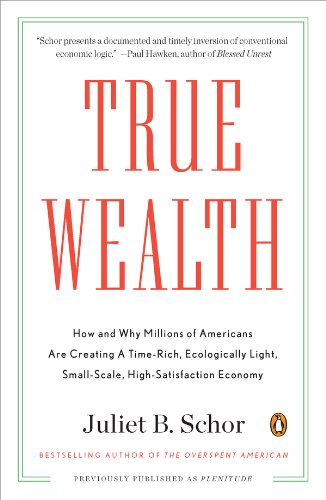True Wealth: How and Why Millions of Americans Are Creating a Time-Rich,Ecologically Light,Small-Scale, High-Satisfaction Economy
amazon.com
True Wealth: How and Why Millions of Americans Are Creating a Time-Rich,Ecologically Light,Small-Scale, High-Satisfaction Economy

Businesses are required to take back what they have sold, so the laws build in more incentives for durability.
Solving our problems in the time we have available is not possible if all we do is change our technology.
an hour of restaurant eating uses 11 kilowatt-hours of energy, while an hour of eating at home (including all travel for food purchasing, gas for cooking, and so forth) uses only 7.4.
Mike Featherstone called this trend “the aestheticization of everyday life.”
more well-being than sticking to business as usual,
We will not arrest ecological decline or regain financial health without also introducing a different rhythm of work, consumption, and daily life, as well as alterations in a number of system-wide structures. We need an alternative economy, not just an alternative energy system.
Prosperity itself can corrode community, by undermining our need for one another.
The smart choices may be those that use exciting new technologies but don’t necessarily raise income in conventional ways, or as conventionally measured. That’s the basic idea behind plenitude.
slowing degradation by shifting technologies or reducing overall growth, will be insufficient to achieve true efficiency and future abundance.